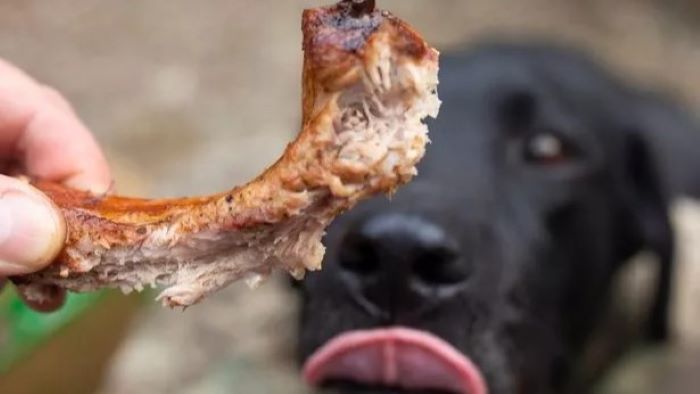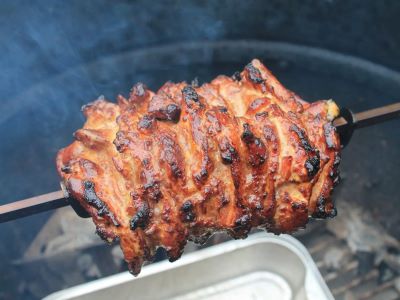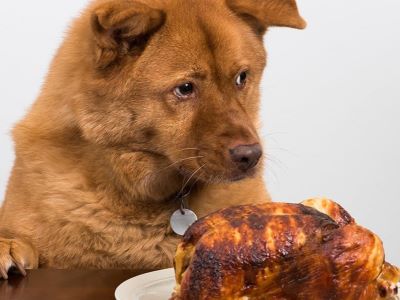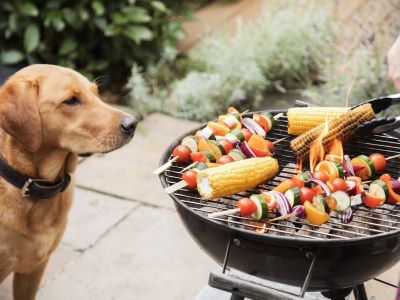Doner meat, also known as doner kebab or gyro meat, is a popular street food and takeaway dish consisting of spiced meat cooked on a vertical rotisserie. It’s made of lamb, beef, or a mix of the two, and is typically served in pitas or wraps with vegetables and sauces. But is this flavorful, meaty street treat suitable and safe for our canine companions to eat as well, or in other words Can Dogs Eat Doner Meat?
In this article, we’ll take a closer look at doner meat itself – its ingredients and characteristics. We’ll discuss reasons why owners might want to share the occasional bite with their dogs. And most importantly, we’ll examine the potential health impacts and risks of feeding doner meat to dogs, using evidence-based veterinary and clinical guidance.

What is Doner Meat?
Döner meat is a Turkish version of donermeat, called “döner kebabı”. Which is usually made from lamb or beef. It is seasoned with various spices and then cooked on a rotating spit. It has been enjoyed in Turkey for over a century.[1]

Doner meat originated in Turkey and made its way as a popular street food in many countries around the globe, including the UK, Germany, and the US. You can now find this at the nearest food trucks, kebab shops, and other fast food outlets.
It is supposed to have a variety of meats in it, including dog, chicken, beef, and lamb. This is exactly why there are all kinds of potential risks associated with your dog.
Can Dogs Eat Doner Kebab Meat?

Dogs can happily eat plain, unseasoned, and cooked meat as part of a healthy and varied diet; doner meat, specifically the seasoned and spiced variety commonly found in kebabs or takeaway dishes, is not recommended for dogs[2]. Here’s why:
Seasonings and Spices:
Doner meat is typically seasoned with a blend of spices and herbs along with seasonings. These seasonings especially garlic and onion, can be harmful and even toxic to your dog. If the dog eats it, even in small amounts, it can lead to health issues.
Fatty Cuts:
This depends on the meat source and preparation, but the doner meat can contain fatty cuts of meat and very high levels of fat and calories. It is very difficult for the dogs to digest. It can cause an upset stomach for the dog or even pancreatitis. Just like humans, the excess calories can lead to weight gain, which can make your pet suffer when it gets old.
Salt Content:
The salt content in seasoned doner meat can be high, and excessive salt intake is not good for dogs. It can lead to dehydration, other health problems and in the worst cases sodium poisoning.
Risks of Dogs Eating Doner Meat

There are risks and potential health concerns for the dogs particularly if the meat is seasoned and spiced. Some of them can be discussed here:
Obesity:
The combination of fatty cuts and high-calorie content in doner meat can contribute to weight gain and obesity in dogs if consumed in large quantities.
Behavioural Issues:
Feeding your dog spicy or highly seasoned foods like doner meat can lead to behavioural issues such as begging or food aggression as your dog may develop a taste for these types of foods.
Allergies:
Some dogs may be allergic to certain types of meats and ingredients used in doner meat, such as spices or additives, which can result in allergic reactions like hives, digestive problems or itching.
Pancreatitis:
The fatty cuts of meat and very high levels of fats contained in the Doner Meat can increase the risk of pancreatitis in dogs. Pancreatitis is a painful and potentially life-threatening condition characterized by inflammation of the pancreas.[3]
Dietary Imbalance:
Doner meat is classified as junk food and is not recommended as a balanced meal for dogs. It lacks essential nutrients that dogs need for their overall health, and frequent consumption or consumption in larger quantities can lead to dietary imbalances.
Alternative Foods for Doner Meat

Many alternative foods are safe and healthy for dogs. Here are some options:
Lean Meats:
Fish, Beef, Turkey, and Chicken are excellent sources of protein for dogs. Be careful about any bones and skin, remove them before cooking if possible, and cook the meat thoroughly before serving.
Eggs:
Eggs are an excellent source of protein for humans too. You can serve it to your dog, cooked or raw as per your dog’s liking. Eggs will provide them with all the necessary calcium as well as proteins needed for their growth.
Dairy:
Some dogs can tolerate small amounts of plain yoghurt, cottage cheese or just cheese. However, it is mandatory to monitor your do for any signs of lactose intolerance. It is common for dogs to be lactose intolerant, so it’s best not to give them milk or milk products unless they have been consuming milk from a young age.
Fruits:
Fruits such as apples, bananas and blueberries, are safe for dogs to eat in moderation. However, refrain from giving your dog grapes or raisins, as they can be poisonous.
Vegetables:
Vegetables such as carrots, green beans, broccoli and sweet potatoes are safe and nutritious for dogs. You can serve it to your dog, cooked or raw as per your dog’s liking.
FAQs
Can Dogs Eat Doner Meat?
While an occasional treat is acceptable, daily consumption is not recommended. Dogs thrive on a balanced diet, and excessive doner meat can lead to nutritional imbalances.
Is Chicken Doner Meat Safe for Dogs?
Yes, plain, cooked chicken doner meat can be safe for dogs in moderation. Remove bones and avoid seasoning.
Can Dogs Eat Doner Meat Leftovers?
Avoid feeding leftovers that contain spices, sauces, or excessive fats. Fresh, plain doner meat is the safest option.
Can Small Dogs Eat Doner Meat?
Yes, but in smaller portions. Adjust serving sizes based on your dog’s size and breed.
How to Introduce Doner Meat to a Dog’s Diet?
Start with small amounts, observe for any adverse reactions, and gradually incorporate them into their meals.
Conclusion
In conclusion, doner meat can be a mouthwatering meal for humans, so it’s essential to follow caution when considering it as a treat for your dog. The highly seasoned and spiced nature of the doner meat, and harmful ingredients like garlic and onion, makes it a risky choice for dog meal. Hence, this article summarises the question “Can Dogs Eat Doner Meat?“
The fat as well as the salt content found in doner kebab meat, can cause problems for your dog. According to a survey, doner kebab meat contains up to 6g of salt, which is an adult’s daily allowance. This much salt could prove dangerous to even fatal to smaller breeds of dogs.
References:
- Doner Kebab | Wikipedia
- Prepare and Cook Doner Kebabs Safely – Brighton & Hove City Council
- Pancreatitis in Dogs | VCA Animal Hospitals



